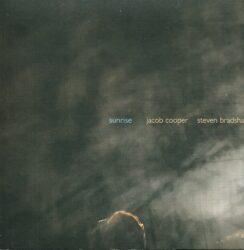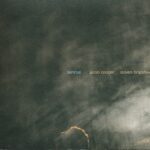JACOB COOPER & STEVEN BRADSHAW – SUNRISE 
Online collaborating – sending music fragments back and forth and thus gradually work on the final result – already was a way of creating music quite common with ‘electronic’ musicians living far apart. The COVID-19 lockdown obviously triggered a lot of these online collaborations – which were often also thematically related to the worldwide crisis. But few – if not none – of them are as surprising as Jacob Cooper & Steven Bradshaw‘s Sunrise.
To understand its background, it’s good to know that Cooper (sounds) and Bradshaw (voice) found their inspiration in a song that was written by Eugene Lockhart and Ernest Seitz during the 1918 pandemic. Shortly after World War I and in the middle of a serious pandemic, The World Is Waiting For The Sunrise gave hope to people in difficult times. The song was later covered many times, by people like Benny Goodman and Les Paul and Mary Ford (who had a big hit with it: check this YouTube version to be impressed by Les Paul’s incredible guitar playing).
Dear one the world is waiting for the sunrise
Ev’ry rose is heavy with dew
The thrush on high, his sleepy mate is calling
and my heart is calling you
But none of these upbeat and uplifting song versions resemble the way Cooper and Bradshaw treated the base material. You wouldn’t probably have recognized the original at all if you didn’t know. And I guess you probably won’t hear or see this version on prime-time radio/tv either (Except in DreamScenes, of course, can’t resist mentioning that).
The 32-minute piece Sunrise is actually divided into three different parts. It opens with a gentle yet somewhat unsettling vocal soundscape of fragmented words from the original lyrics. This slowly gets more intense when low-pitched harmonics are introduced together with a somewhat ritualistic rhythm.
Then, around the 10-minute mark, the style suddenly changes. The abstract vocal samples turn into voice loops that sounds like a more conventional ‘song’. The samples are looped and stacked together into an impressive choral piece demonstrating Bradshaw‘s vocal capabilities in full.
Its prettiness, however, is deceiving: the ‘stacking’ of the loops relentlessly continues, building a sonic web from which escape is impossible. Ultimately, it climaxes into harsh waves of noise – which last quite a bit longer than is comfortable (just like the pandemic itself did, by the way).
If you set the volume louder in the beginning to hear all subtle details, there is a chance that you (or your neighbors) may begin to regret that at this point!
But there’s still the third and closing part to come. It offers the opportunity to regain yourself. The piece calms down again with a bright and hopeful piano theme – and floating (yet dissonant) vocals. Some of the distorted noise keeps intruding at intervals as if to remind us that danger still lurks around the corner. When the music falls silent, a few birds can still be heard – so all of this ends with of positive note (as did the original song). Nature will prevail. Probably.




